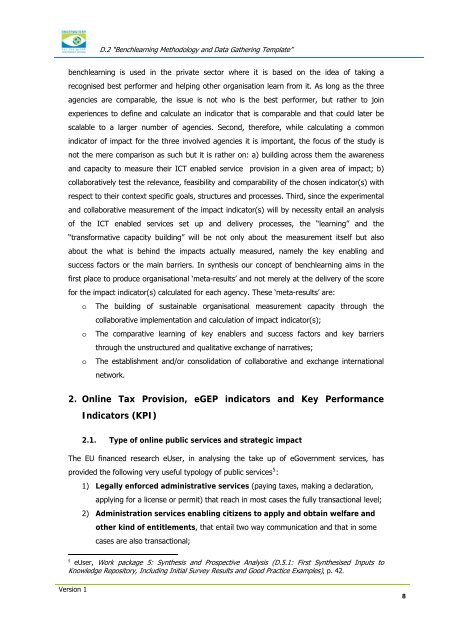Benchlearning methodology and data gathering template
Benchlearning methodology and data gathering template
Benchlearning methodology and data gathering template
- No tags were found...
You also want an ePaper? Increase the reach of your titles
YUMPU automatically turns print PDFs into web optimized ePapers that Google loves.
D.2 “<strong>Benchlearning</strong> Methodology <strong>and</strong> Data Gathering Template”benchlearning is used in the private sector where it is based on the idea of taking arecognised best performer <strong>and</strong> helping other organisation learn from it. As long as the threeagencies are comparable, the issue is not who is the best performer, but rather to joinexperiences to define <strong>and</strong> calculate an indicator that is comparable <strong>and</strong> that could later bescalable to a larger number of agencies. Second, therefore, while calculating a commonindicator of impact for the three involved agencies it is important, the focus of the study isnot the mere comparison as such but it is rather on: a) building across them the awareness<strong>and</strong> capacity to measure their ICT enabled service provision in a given area of impact; b)collaboratively test the relevance, feasibility <strong>and</strong> comparability of the chosen indicator(s) withrespect to their context specific goals, structures <strong>and</strong> processes. Third, since the experimental<strong>and</strong> collaborative measurement of the impact indicator(s) will by necessity entail an analysisof the ICT enabled services set up <strong>and</strong> delivery processes, the “learning” <strong>and</strong> the“transformative capacity building” will be not only about the measurement itself but alsoabout the what is behind the impacts actually measured, namely the key enabling <strong>and</strong>success factors or the main barriers. In synthesis our concept of benchlearning aims in thefirst place to produce organisational ‘meta-results’ <strong>and</strong> not merely at the delivery of the scorefor the impact indicator(s) calculated for each agency. These ‘meta-results’ are:o The building of sustainable organisational measurement capacity through thecollaborative implementation <strong>and</strong> calculation of impact indicator(s);o The comparative learning of key enablers <strong>and</strong> success factors <strong>and</strong> key barriersthrough the unstructured <strong>and</strong> qualitative exchange of narratives;o The establishment <strong>and</strong>/or consolidation of collaborative <strong>and</strong> exchange internationalnetwork.2. Online Tax Provision, eGEP indicators <strong>and</strong> Key PerformanceIndicators (KPI)2.1. Type of online public services <strong>and</strong> strategic impactThe EU financed research eUser, in analysing the take up of eGovernment services, hasprovided the following very useful typology of public services 5 :1) Legally enforced administrative services (paying taxes, making a declaration,applying for a license or permit) that reach in most cases the fully transactional level;2) Administration services enabling citizens to apply <strong>and</strong> obtain welfare <strong>and</strong>other kind of entitlements, that entail two way communication <strong>and</strong> that in somecases are also transactional;5eUser, Work package 5: Synthesis <strong>and</strong> Prospective Analysis (D.5.1: First Synthesised Inputs toKnowledge Repository, Including Initial Survey Results <strong>and</strong> Good Practice Examples), p. 42.Version 18
















